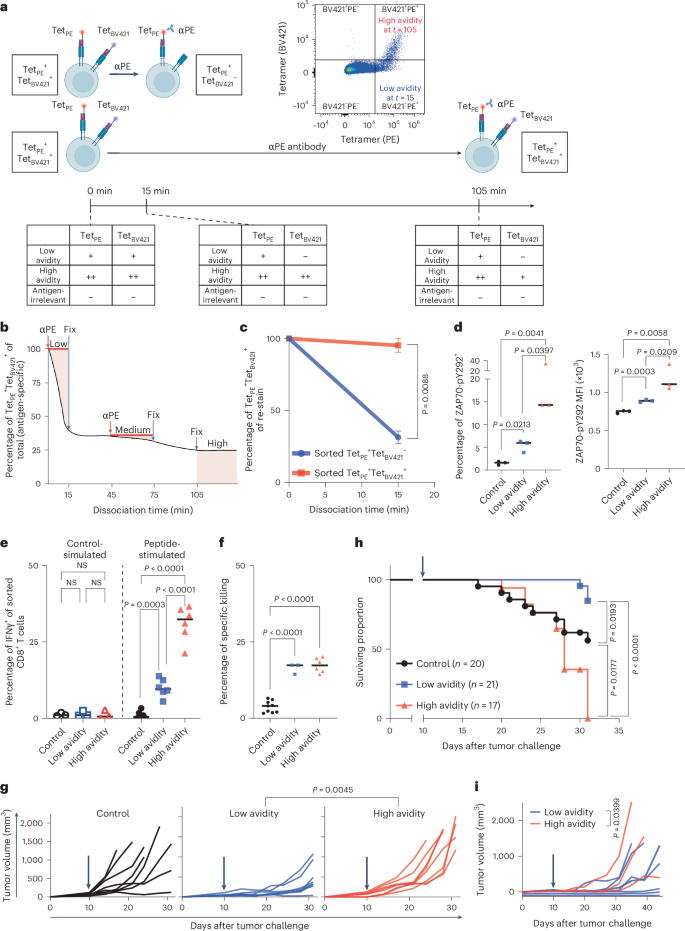Low-avidity T cells drive endogenous tumor immunity in mice and humans
IF 27.7
1区 医学
Q1 IMMUNOLOGY
引用次数: 0
Abstract
T cells recognize neoepitope peptide-major histocompatibility complex class I on cancer cells. The strength (or avidity) of the T cell receptor–peptide-major histocompatibility complex class I interaction is a critical variable in immune control of cancers. Here, we analyze neoepitope-specific CD8 cells of distinct avidities and show that low-avidity T cells are the sole mediators of cancer control in mice and are solely responsive to checkpoint blockade in mice and humans. High-avidity T cells are ineffective and immune-suppressive. The mechanistic basis of these differences lies in the higher exhaustion status of high-avidity cells. High-avidity T cells have a distinct transcriptomic profile that is used here to calculate an ‘avidity score’, which we then use for in silico identification of low-avidity and high-avidity T cells in mice and humans. Surprisingly, CD8+ T cells with identical T cell receptors exhibit wide variation in avidities, suggesting an additional level of regulation of T cell activity. Aside from providing a better understanding of endogenous T cell responses to cancer, these findings might instruct future immunotherapy strategies. Here the authors show that, in mouse tumors, CD8+ T cells with a low-avidity TCR are the mediators of antitumor and immunotherapy responses, in part because T cells with a high-avidity TCR are more exhausted.


低亲和力T细胞驱动小鼠和人类的内源性肿瘤免疫
T细胞识别癌细胞上的新表位肽-主要组织相容性复合体I类。T细胞受体-肽-主要组织相容性复合体I类相互作用的强度(或亲疏度)是癌症免疫控制的关键变量。在这里,我们分析了不同活性的新表位特异性CD8细胞,并表明低活性T细胞是小鼠癌症控制的唯一介质,并且仅对小鼠和人类的检查点阻断有反应。高亲和性T细胞是无效的和免疫抑制的。这些差异的机制基础在于高贪婪细胞的高耗竭状态。高亲和性T细胞具有独特的转录组谱,用于计算“亲和性评分”,然后我们将其用于在小鼠和人类中进行低亲和性和高亲和性T细胞的计算机鉴定。令人惊讶的是,具有相同T细胞受体的CD8+ T细胞在活性上表现出广泛的差异,这表明对T细胞活性的调节有额外的水平。除了更好地了解内源性T细胞对癌症的反应外,这些发现可能会指导未来的免疫治疗策略。
本文章由计算机程序翻译,如有差异,请以英文原文为准。
求助全文
约1分钟内获得全文
求助全文
来源期刊

Nature Immunology
医学-免疫学
CiteScore
40.00
自引率
2.30%
发文量
248
审稿时长
4-8 weeks
期刊介绍:
Nature Immunology is a monthly journal that publishes the highest quality research in all areas of immunology. The editorial decisions are made by a team of full-time professional editors. The journal prioritizes work that provides translational and/or fundamental insight into the workings of the immune system. It covers a wide range of topics including innate immunity and inflammation, development, immune receptors, signaling and apoptosis, antigen presentation, gene regulation and recombination, cellular and systemic immunity, vaccines, immune tolerance, autoimmunity, tumor immunology, and microbial immunopathology. In addition to publishing significant original research, Nature Immunology also includes comments, News and Views, research highlights, matters arising from readers, and reviews of the literature. The journal serves as a major conduit of top-quality information for the immunology community.
 求助内容:
求助内容: 应助结果提醒方式:
应助结果提醒方式:


